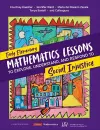
Early Elementary Mathematics Lessons to Explore, Understand, and Respond to Social Injustice
4 authors - Paperback
£29.99
Courtney Koestler is currently the Director of the OHIO Center for Equity in Mathematics and Science (OCEMS) and an Associate Professor of Instruction in the Patton College of Education at Ohio University. Courtney earned a BS in Elementary Education with a concentration in mathematics at Ohio University, an MA in Teaching at George Mason University, and a Ph.D. in Curriculum and Instruction at the University of Wisconsin. Courtney began teaching in public elementary and middle schools as a classroom teacher in 1998, went on to serve as a K-5 math coach, and then started working as a university-based teacher educator and researcher. In addition to now teaching diversity and mathematics methods courses in an early childhood-elementary education program and graduate action research courses, Courtney spends time in classrooms alongside teacher colleagues teaching children and out in communities working with families. These experiences continue to guide Courtney in understanding teaching and learning as a equity- and justice-oriented endeavor. Jennifer Ward is currently an Assistant Professor of Elementary and Early Childhood Mathematics Education and Elementary Undergraduate Program Coordinator at Kennesaw State University. Jennifer earned a BS in Elementary and Special Education and a MA in Early Childhood Education from the State University of New York at Geneseo. During her PhD in Curriculum and Instruction (with a dual focus in Early Childhood and Mathematics Education) at the University of South Florida, she became interested in social justice mathematics for young children. Her work centered around her experience as an early childhood teacher designing and teaching MfSJ lessons with children ages 3-8. Jennifer has been a teacher in classrooms from Prekindergarten to high school, with the majority of her work in Kindergarten and First grade classrooms. As an instructor of P-2 methods, university supervisor, and mother of two young girls Jennifer sees the ways issues of social justice and mathematics are taken up (or fail to be) in school spaces. These experiences help Jennifer to conceptualize ways that early childhood (mathematics) teachers can bring authentic, real world issues and mathematics into classrooms where children can unpack them and use their voice and power to call for change. Maria del Rosario Zavala is an American-born daughter of Peruvian immigrants, a mother, and an Associate Professor of Elementary Education at San Francisco State University. She studied mathematics at the University of California, Santa Cruz almost(!) became a high school math teacher, before working in elementary education. Across her 20+ career in education, she has worked in classrooms across the K-12 spectrum, and supported teachers’ professional learning in a variety of contexts. During her PhD in Education with a focus on Learning Sciences at the University of Washington, she became interested in ethnomathematics and social justice mathematics, and in particular how topics like these can make mathematics classrooms welcoming spaces for Latinx students and other historically marginalized populations. In addition to work on the role of racial and other socially constructed identities in learning mathematics, a large part of her research agenda includes defining, expanding, and evolving ideas of culturally responsive mathematics teaching (CRMT) – in particular the impact of CRMT on both teachers and students. Maria believes mathematics teaching and learning are creative endeavors. She has unequivocal faith in teachers, and the power of teachers, parents, and community members working together to make schools places worthy of our children. Tonya Gau Bartell is currently an associate professor of mathematics education in the College of Education at Michigan State University and serves as the associate director of elementary programs. Tonya earned a BS in mathematics from St. Cloud State University, an MA in curriculum and instruction from the University of Minnesota, and a PhD. in curriculum and instruction at the University of Wisconsin-Madison. Tonya began teaching 25 years ago as a high school mathematics teacher, including 3 years as a founding teacher in an alternative high school to support students labeled as not succeeding by the system. For the last 15 years, she has volunteered in elementary mathematics classrooms and studies elementary mathematics education. Tonya is passionate about learning about and supporting teachers in developing equitable mathematics instructional practices that recognize and transgress systemic inequity. She understands that issues of culture, race, ethnicity, identity, and power influence students’ opportunities to learn and teachers’ opportunities to teach mathematics and that these factors must be explicitly discussed and addressed if we hope to fully support equitable mathematics teaching and learning. Tonya is honored to have participated in the writing of this book and in continued efforts supporting mathematics education that explores, understands, and responds to social injustice and supports students’ learning of mathematics.